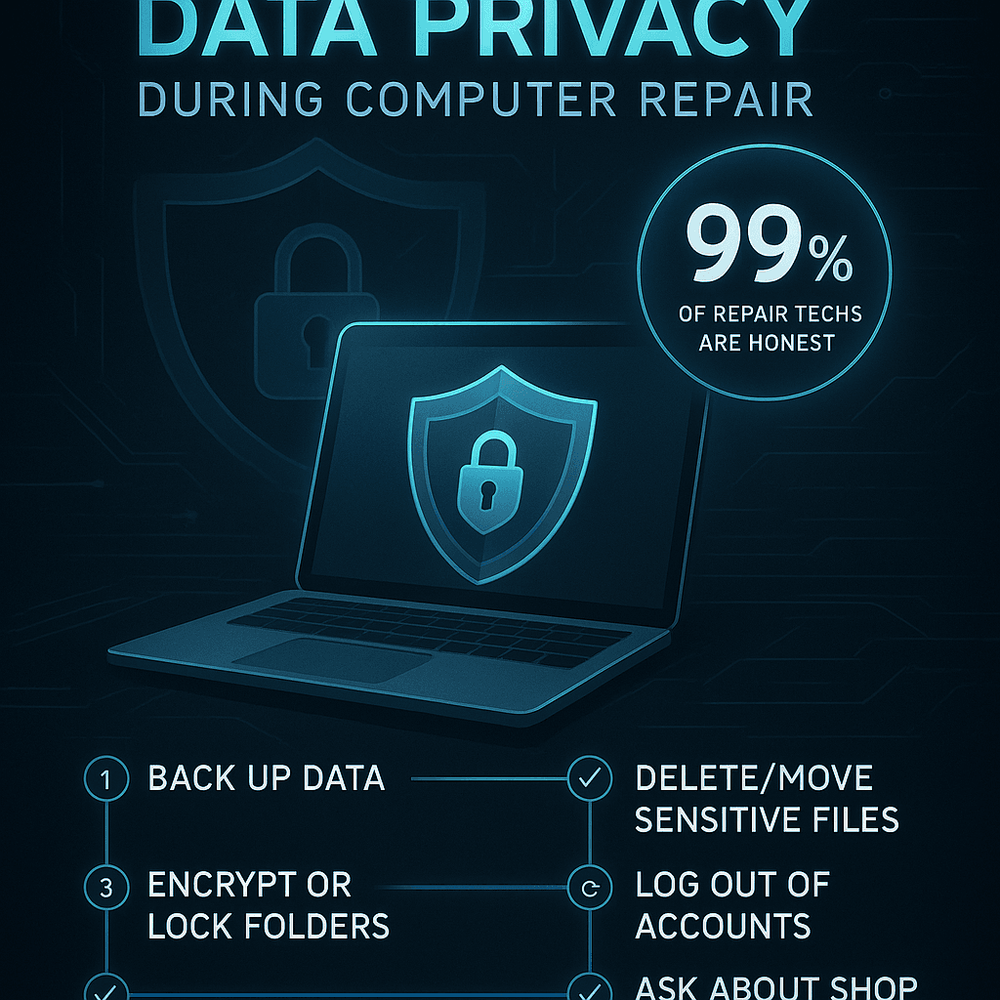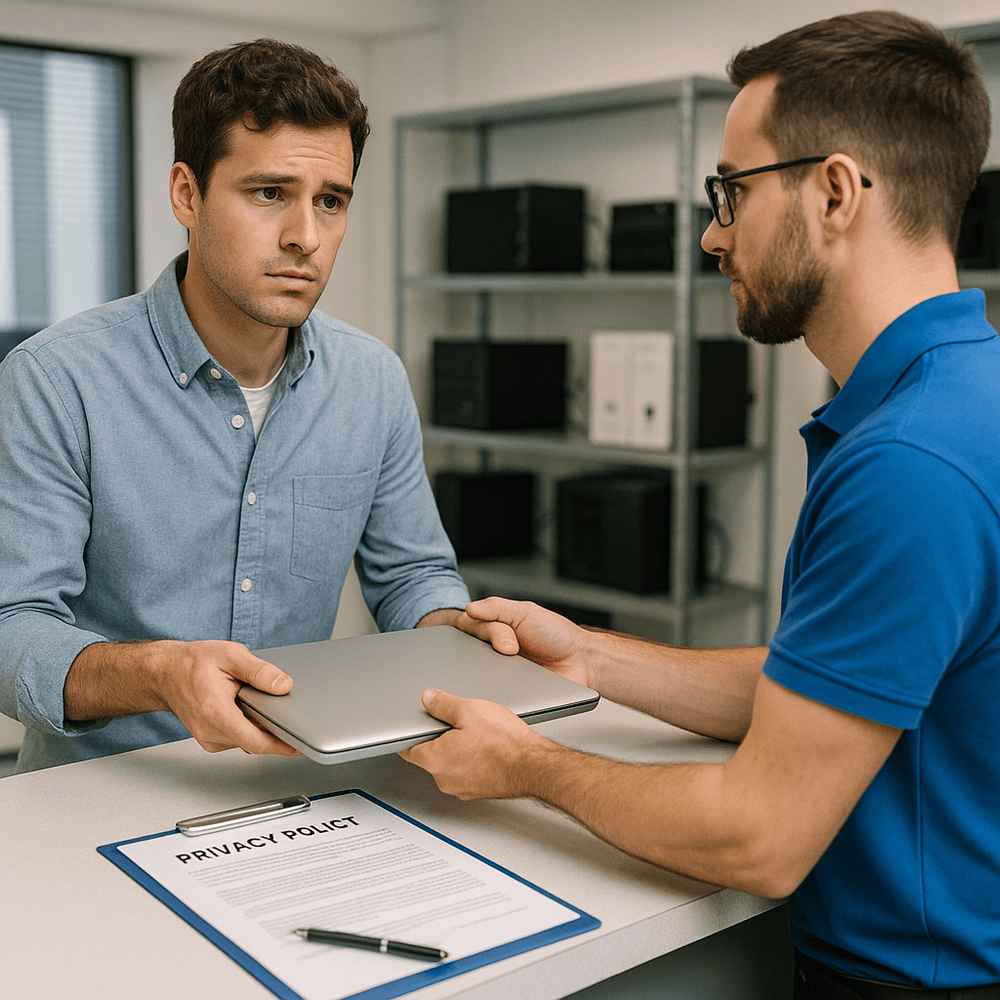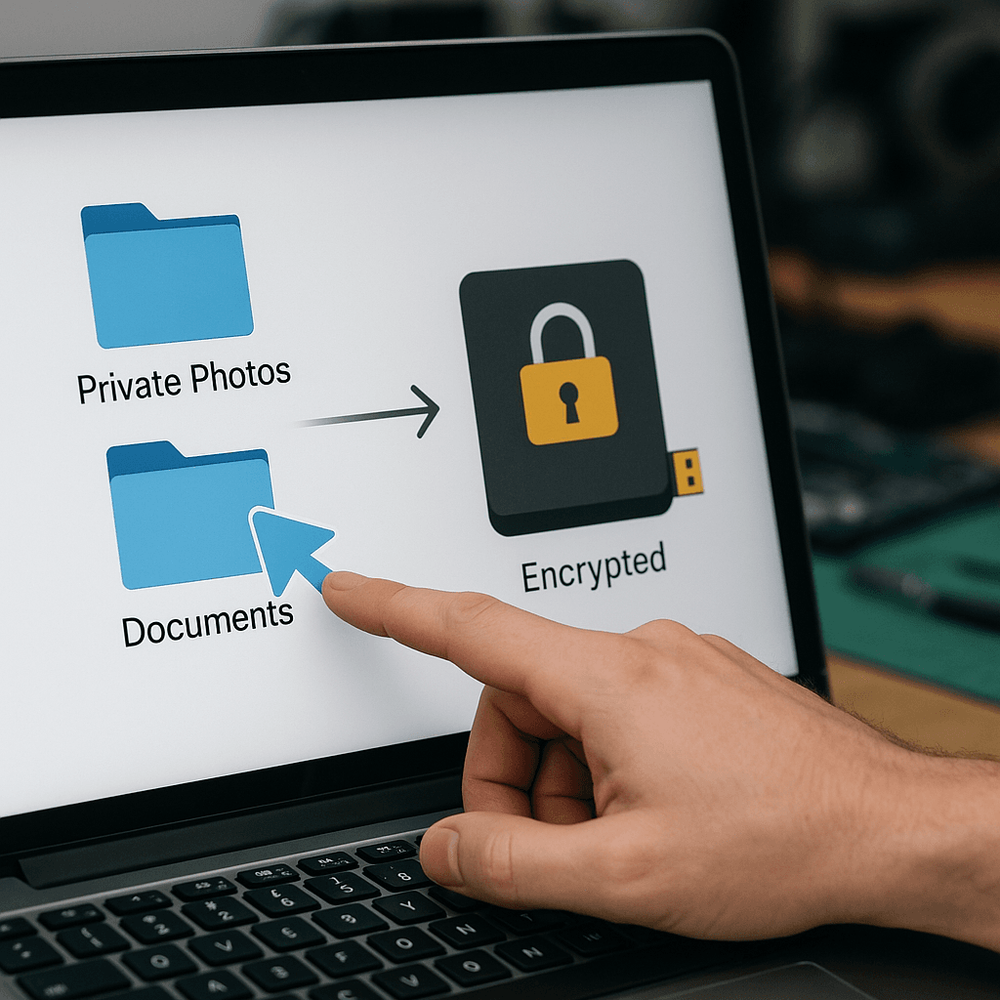Inside Secrets: Will the Computer Repair Guy Look at My Nudes? What Really Happens to Your Private Photos During Repair
Inside Secrets: Will the Computer Repair Guy Look at My Nudes? What Really Happens to Your Private Photos During Repair

1. Introduction: Computer Repair and Privacy Concerns in 2025
Are you worried about what happens to your private photos or documents when you leave your computer at a repair shop? You aren’t alone. With growing awareness about computer repair and privacy concerns, questions about privacy during computer repair are more common than ever. Stories about data leaks and digital snooping can make anyone anxious, especially when it comes to sensitive or personal images.
The truth is, most professionals focus only on fixing your device. But occasional breaches do happen, even at reputable stores. This makes a data privacy checklist for repairs as important as making a backup of your files. In this guide, you’ll get clear, honest answers about laptop repair photo privacy, real tech perspectives, and easy steps to keep your private photos safe before a repair.

2. What Do Computer Techs Actually Do During a Repair?
When you drop off your computer, what do computer techs check during repair? Mainly, their job depends on what’s broken:
- For hardware fixes (like screens, batteries, keyboards), technicians rarely need to access your files.
- For software or operating system issues, they may need to log in. This could give them access to documents or photos if the device is unlocked.
Legitimate shops usually have clear technician confidentiality rules. Most require staff to sign contracts or privacy agreements, promising not to access or misuse your files. If you’re wondering, "Does the technician see my documents?"—they shouldn’t, unless they need to verify a fix. Always confirm which files are accessible to repair staff and ask about their privacy policy before leaving your device.
3. Why Do Repair Techs Sometimes Check Private Files?
Do techs browse customers files or check your photos? Almost all pros do not care about your nude or personal pictures. Their priority is efficient repair, not snooping. However, Reddit threads and rare news stories show that—sometimes out of curiosity or poor ethics—a small percent might browse files if the computer is unlocked or if private folders are left open.
Privacy risks of computer repair are small but real. Some well-known companies have even faced lawsuits over staff leaking customer photos. While it’s not common, the best approach is to secure your files in advance; you can’t always control who might be tempted.
Expert tip: Even if you delete photos, some techs can recover them unless you’ve fully wiped or overwritten the data.

4. What Files Are Most at Risk in a Repair Shop?
The major risks of leaving nudes on your laptop or other sensitive info come from files stored in obvious places: the Desktop, Documents, Downloads, and Pictures. Unencrypted and easy-to-find folders can be tempting. Even “deleted” images may remain accessible unless securely erased.
Keeping personal images safe during repair matters, especially in untrusted repair shops where data leakage is more likely. For typical hardware repairs, you should not have to provide your password; ask why it’s needed if you’re told otherwise.
Reddit insight: “You’re just not that interesting to most techs—they see thousands of laptops and just want to finish your repair.”
5. What Privacy Protections Exist at Most Repair Shops?
Are there trusted computer repair services? Yes—many established repair shops uphold professional ethics in computer repair. Expect to see:
- Written repair shop employee privacy policies
- Confidentiality agreements with staff
- Clear answers if you ask about their privacy practices
Some regions even have privacy regulations for repair shops. These may provide legal protection against data snooping and set requirements for sensitive data management at repair shops. Shops that make personal information security a priority will respect your concerns and set clear boundaries.
If you ask about a computer repair shop confidentiality agreement and the answers are vague, consider it a warning sign.
6. Can You Trust Your Computer Repair Person?
Wondering, "Can I trust my computer repair guy?" Here’s what to look for:
- Positive reviews on trusted platforms
- Certifications or partnerships with well-known brands
- Clear written privacy policies
To ensure your privacy at a repair shop, ask questions about your rights during computer repair. Is it safe to leave your laptop at a repair shop? Usually yes, but only if you’ve protected your sensitive data first. Leaving nudes or sensitive info on your computer can have real consequences if things go wrong, from embarrassment to data leaks. Trust—but always verify.
7. Step-by-Step Guide: How to Protect Sensitive Files Before Repair
Here’s how to protect sensitive files before repair and keep photos private from technicians:
- Back up all important data. Copy private files and photos to an external drive or secure cloud.
- Delete private pictures and sensitive content. Move or delete them so they aren’t on the device when you drop it off.
- Clear out browser histories and sign out of apps. Lock down your accounts.
- Use password protection or guest mode. For repairs requiring login, set up a fresh user account with no personal files.
- Use file/folder encryption. Encrypt anything sensitive with built-in tools like BitLocker (Windows) or FileVault (Mac).
- Wipe the device before repair (if extremely concerned). Perform a full factory reset and restore your files afterward.
If you can’t decide what files to remove before laptop repair, err on the side of caution—remove anything you wouldn’t want a stranger to see.
8. Advanced Security: Encrypting, Locking & Hiding Sensitive Files
For extra protection:
- Lock personal photos on PC: Use password-protected folders or “vault” apps.
- Encrypt your files or entire drive: Windows and Mac offer easy-to-use privacy software (BitLocker, FileVault) to block access without your password.
- Invest in encrypted USB drives: The best encrypted storage for private photos combines portability and high security.
- Hide files in less-obvious folders: Good for basic privacy, but don’t rely on “hiding”—encryption is stronger.
Are encrypted folders secure? Yes—without your password, even repair staff can’t read the contents. Just remember your passwords to avoid losing access.
9. Practical Options if Your Device is Unusable or Already Broken
If you can’t access your files before sending your laptop for repair:
- Remove the hard drive. Connect it to another computer to back up or erase sensitive files before booking the repair.
- Create a new “Guest” user account. If you can log in, give techs access only to a clean profile.
- Communicate clearly with the shop. Tell them you want work documents kept private and that you value your privacy.
- Ask for your data not to be accessed unless absolutely necessary.
Digital privacy tips for repairs still matter, even if your device is not bootable. It’s always your right to specify your privacy concerns.
10. What If a Tech Accessed or Copied Your Personal Data?
How do you check if files were accessed after repair, or see signs your files have been accessed?
Watch for:
- File “last opened” dates that don’t match your usage
- New, unfamiliar files or folders
- Missing/moved photos or documents
If you suspect data leakage from a repair shop, report it immediately. Most shops—and some laws—offer protection against data snooping. Make your privacy needs clear up front, and don’t hesitate to escalate if you spot inappropriate behavior.
11. Quick Reference: Best Practices & Data Privacy Checklist for Repairs
Before any repair, follow this data privacy checklist:
- Back up all data before repairs begin.
- Delete or move private files off your device.
- Encrypt or lock down sensitive folders and photos.
- Log out of all accounts; clear browser and app histories.
- Ask if your password or device unlock is truly needed (push back if it’s for hardware fixes).
- Observe any device checks when possible.
- Choose shops with strong privacy promises and good reputations.
These steps dramatically reduce your risk and keep your files safe.
12. Conclusion & Reassurance: Are Your Photos Safe At Repair Shops?
Should you worry about private images when handing in your computer for repair? For most users, no: about 99% of technicians are honest and uninterested in your files. Still, privacy during computer repair is a real concern. Protecting images during hardware repair is your responsibility—if you follow the data privacy checklist above, your photos and sensitive info should stay secure.
13. FAQ: Real Answers to Common Repair Privacy Questions
Q: Do repair shops check your photos or will computer technicians access personal photos?
A: Almost all techs don’t care or look. But a small percentage might if the device is unlocked and files are visible. Always safeguard your data.
Q: Do you have to give your password to the repair guy?
A: Only needed for some software issues or testing. For hardware repairs, you usually don’t need to provide it. Ask to observe if they require access.
Q: Can the tech see browser history, copy files, or recover deleted images?
A: Yes, if your device is unlocked and data is not protected. Deleted images are often easy to recover unless you securely erase them.
Q: Should I remove personal information before repair?
A: Always. It’s uncommon for techs to snoop, but not impossible. Deleting or moving files gives you control.
Q: Is it common for techs to snoop?
A: No, it’s rare. But taking precautions keeps you and your info safe if you ever encounter a “bad apple.”
Take control of your digital privacy before any repair. When you follow these steps, your sensitive files and private photos will stay protected—no matter where your computer ends up.